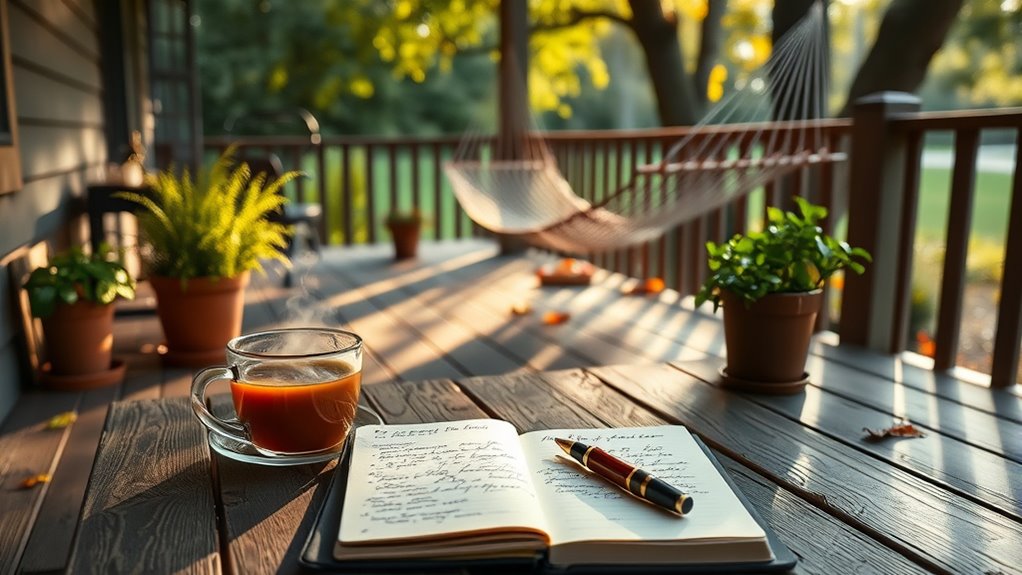By embracing slow living, you intentionally set aside time for reflection, which helps you become more aware of your priorities and emotions. Incorporating mindful habits and rituals creates space for honest self-evaluation, reducing stress and clarifying what truly matters. As you practice regularly, this awareness naturally deepens, guiding your decisions and fostering a more authentic, peaceful life. Keep exploring how these simple practices can lead you to greater clarity and purpose.
Key Takeaways
- Regular reflection helps identify core values and priorities, guiding more intentional daily choices.
- Mindful habits cultivate present-moment awareness, reducing mental clutter and increasing clarity.
- Daily rituals create stability and space for self-evaluation, deepening understanding of personal needs.
- Awareness of patterns and triggers enhances decision-making aligned with authentic goals.
- Embracing slow living fosters a peaceful mindset that clarifies what truly matters in life.

Slow living is about intentionally embracing a more mindful and relaxed approach to everyday life. It encourages you to slow down, pay attention to the present moment, and prioritize what truly matters. One of the key ways to cultivate this lifestyle is by establishing mindful habits—simple practices that help you stay grounded and aware throughout the day. These habits aren’t about perfection but about creating a foundation of awareness that guides your actions and thoughts. For instance, taking a few deep breaths before starting your work or pausing to appreciate your morning coffee can turn routine moments into opportunities for reflection. Over time, these mindful habits become second nature, gently shifting your focus from constant busyness to meaningful presence.
Slow living encourages mindful habits that ground you in the present moment and foster genuine reflection.
In addition to mindful habits, developing intentional daily rituals plays a significant role in fostering clarity through reflective practices. Daily rituals are deliberate actions you incorporate into your routine to create a sense of stability and mindfulness. This could be something as simple as journaling for five minutes each morning, setting aside time for a mindful walk, or preparing a calming tea before bedtime. These rituals serve as anchors that ground you in the present, helping you disconnect from distractions and tune into your inner experience. When you perform these rituals consistently, they become cues for reflection—moments when you evaluate how you’re feeling, what’s working, and what might need adjustment. Incorporating intentional practices like tuning into your environment can further deepen your awareness and support your journey toward clarity.
By integrating mindful habits and daily rituals into your routine, you naturally cultivate a space for intentional reflection. This reflection is essential because it allows you to gain clarity about your priorities, values, and emotional state. Instead of rushing through your days on autopilot, you start to notice patterns, triggers, and subtle shifts in your mood or energy. That awareness enables you to make conscious choices aligned with your genuine needs, reducing stress and increasing fulfillment. Over time, this process of reflection becomes a habit in itself, guiding you toward a more intentional life.
As you practice this, you’ll find that clarity emerges from regular self-awareness. You’ll become more attuned to what truly matters and less caught up in external expectations. Slow living isn’t about doing everything perfectly, but about making space for honest reflection and meaningful connection with yourself. It’s a gentle reminder that by prioritizing mindful habits and daily rituals, you can create a more peaceful, focused, and authentic way of living.
Frequently Asked Questions
How Can I Start Practicing Slow Living Daily?
To start practicing slow living daily, begin with mindful mornings—set aside a few quiet minutes to breathe and focus. Incorporate intentional journaling to reflect on your goals and feelings, helping you stay present. Avoid rushing through your day; instead, slow down and savor each moment. By consistently prioritizing awareness and reflection, you’ll cultivate clarity and find more peace in your everyday life.
What Are Common Challenges When Adopting Slow Living?
When adopting slow living, you might face challenges like staying committed to mindful habits or maintaining environmental awareness consistently. Distractions and busy schedules can pull you away from intentional reflection, making it hard to stay present. You may also struggle to balance societal expectations with your desire for simplicity. Overcoming these hurdles involves patience, setting realistic goals, and regularly reassessing your priorities to deepen your connection with slow living principles.
How Does Slow Living Impact Mental Health?
While rushing through life often fuels stress, slow living boosts your mental health by fostering mindfulness practices and emotional resilience. You become more present, reduce anxiety, and develop healthier coping strategies. This deliberate pace helps you process emotions better, build stronger self-awareness, and cultivate a calmer mind. Embracing slow living allows you to prioritize mental well-being, ultimately leading to a more balanced, resilient, and fulfilled life.
Can Slow Living Improve Relationships?
Yes, slow living can improve your relationships. When you practice mindful communication, you listen more attentively and respond thoughtfully, fostering deeper emotional connections. Taking time to slow down helps you be present, reducing misunderstandings and strengthening bonds. By prioritizing quality interactions over rushing, you create a space for genuine connection, making your relationships more meaningful and resilient.
What Are Simple Tools for Intentional Reflection?
Ever wonder how you can deepen your self-awareness? Simple tools like mindful journaling help you capture thoughts and emotions, fostering clarity. Quiet contemplation allows you to pause and reflect without distractions. You might find that setting aside a few minutes daily for these practices helps you connect with your inner self, guiding intentional living. These straightforward methods make reflection accessible, empowering you to live more intentionally and with greater purpose.
Conclusion
So, here’s the irony: by slowing down and reflecting intentionally, you actually speed up your clarity. It’s funny how doing less often leads to more. Instead of chasing after quick fixes or endless busyness, you find that the simplest moments bring the clearest answers. So, take a breath, embrace the slow, and watch how clarity quietly unfolds — because sometimes, the least hurried path reveals the most. Who knew slowing down was the shortcut you needed?








